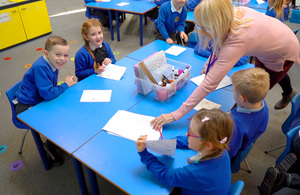Bumper 拢24 million to boost children鈥檚 literacy
Primary school pupils to benefit from phonics and literacy teaching thanks to new government funding

More primary school pupils聽will聽benefit from聽high quality phonics and expert literacy teaching as part of new funding announced today (Sunday 9 October).
Over 拢24 million is set to be invested in building children鈥檚 literacy skills as the government continues to support pupils鈥� recovery from the pandemic and work towards the target of 90% of primary children reaching the expected standard in literacy and numeracy.
The announcement marks the conclusion of Dyslexia Awareness Week, with targeted literacy support playing a pivotal role in helping pupils with dyslexia develop all-important reading and writing skills.
The investment is part of the Government鈥檚 commitment to make sure every young person leaves school with a strong grasp of literacy and maths, and sits alongside further targeted support such as the National Tutoring Programme.
Education Secretary Kit Malthouse said:
If any child leaves schools without the ability to read and write properly, we have failed them.
It is imperative that we support schools and pupils following the disruption of the pandemic. This funding will help us do that, but also help to instil a love of reading in young people that can last throughout their education and beyond.
Rachel Davis, Headteacher and Strategic Lead, Little Sutton English Hub said:
The funding available to schools to implement validated phonics programmes has been wide reaching, particularly with the introduction of the Accelerator Fund programme last year.
Our team of highly trained Literacy Specialists have worked with schools to deepen their understanding of the impact of phonics teaching.
Crucially, our work in the English Hubs Programmes has given staff the ability to identify specific barriers to individual pupils鈥� learning and implement precise, swift intervention. This has helped children who find reading more difficult to achieve success. It has also greatly supported schools in their Covid Recovery programme.
The funding will support the continuation and growth of the English Hubs Programme, enabling even more schools to embed high quality phonics teaching and benefit from the intensive support and access to literacy specialists.
The programmes will help build children鈥檚 confidence and ability to read and write, including for those with dyslexia, and provide a solid foundation for children to build upon so they can develop the habit of reading widely and often, for both information and for fun.
Building on the Accelerator Fund - which helps schools access specialist programmes of support for pupils and has so far seen 拢4 million distributed to over 450 schools - this funding will boost existing programmes in schools to support pupils鈥� learning to read.
Phonics approaches, when embedded in a rich literacy environment, are amongst the most effective methods of teaching children to read, particularly those from disadvantaged backgrounds, according to evidence from the Education Endowment Foundation (EEF).
This sits alongside the Government鈥檚 commitment to support schools with early identification of need and intervention for children who require extra support, as clearly outlined in the Schools White Paper, SEND Review and Alternative Provision Green Paper.